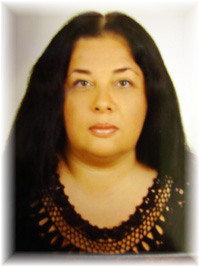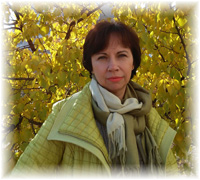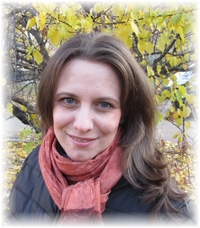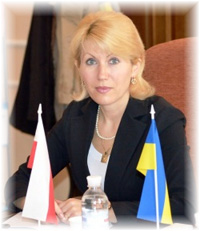Experts about the project
Experts about the project

- Your full name, the name of organization you represent, the title of your position?
Ostapov Alexandr, UPO “All-Ukrainian Harm Reduction Association”, Head of the Board.
- What are the relevance and importance of this project for Ukrainian HIV-service?
The project will be able to fill the existing gaps in preventive harm reduction activities supported by the Global Fund.
In my opinion, this is a very timely and necessary intervention directed at such a hard-to-reach group as women IDUs. Based on many years of my experience in harm reduction, I can say that male IDUs use the services more frequently and their number in prevention is about 75% of the total coverage of prevention programs. At the same time women IDUs are an important focus group, which determines the containment of the epidemy both horizontally (from partner to partner) and vertically (from mother to child).
- How do you think what changes can bring current project in the work of HIV-service NGOs?
Making this focus group more approachable will allow NGO to expand its range of services, to make it more gender-sensitive; obtain new experience and possibly open up new areas of work, such as work with children of female IDUs; strengthen activities in the field of reproductive health of women at risk and women who are in OST programs; pay more attention to human rights and advocacy work. The project also may encourage NGOs to create a social business for such women – a kind of club with a psychologically-safe area where women will be able to get (buy/sell) cosmetic, hairdressing, hygienic and other household services. It would be the first step to financial independence.
- What steps are necessary for the effective implementation of the project?
The base is an experience in harm reduction. It will ensure a stable start of the project. The second important step is staff of the project. It is necessary to conduct trainings with social workers and other professionals involved to ensure the same understanding of importance and peculiarities of work with this target group. In my opinion, case management should be a mandatory component of the project. Forwarding will not work here as it works in case of male IDUs. Female IDUs are more closed, psychologically unstable, less protected. This must be taken into account in the project.
- What challenges/barriers do you see during implementation of our project?
– First of all, it is an unwillingness of NGOs’ staff to work with this group of PWID;
– Weak (or absent) training component.
– Inability to build case management due to (for example) limited funding.
- Please name the main characteristics (professionally important qualities, psychological characteristics, distinctive features, etc.) of social and outreach workers of Ukrainian HIV-service organizations, which can be useful for our gender project?
Understanding and accepting of harm reduction philosophy as a tool for prevention of HIV/STI/Hepatitis among the target group. This is a fundamental component, which consist of experience, nuances of counseling, building of trustworthy relationships between clients and social workers. From my own experience, considering the specificity of this target group, I am convinced that a female social worker will find the approach to female IDUs faster.
The role of the psychologist in this project deserves special attention. More probably that female IDUs will visit psychologist. I often noticed this in my project, what once again underlines the need for them to speak out, to find support/answers, to hear a professional advice. The organization should provide the project with the possibility to create self-help groups, carry out group work.

- Your full name, the name of organization you represent, the title of your position?
Lintsova Viktoria, UPO “The Association of Substitution Treatment Advocates of Ukraine”, regional representative of “The Association of Substitution Treatment Advocates of Ukraine” in Kirovograd region.
- What are the relevance and importance of this project for Ukrainian HIV-service?
In my opinion, one of the major problems of HIV-service (and harm reduction services in particular) are various gender barriers that may both prevent access to services for keygroups and influence significantly on their quality. According to my observation there are following groups of problems:
– the low level of training and knowledge on “gender” topic of service providers , their personal liability to gender stereotypes (what is inevitably projected onto work with clients);
– the lack of women’s involvement in the assistance programs (it is well observed in the OST programs, where the number of women ranges from 8% to 20%, while the estimated number of women among IDUs – 30-35%);
– gender stereotypes as an additional risk of HIV infection (stereotypes in our society are precondition for this). Examples: “strong” men believe that to seek psychological help is shameful, “weak” women do not discuss condom use with partners, while being exposed to the risk of infection and unwanted pregnancy.
I think the project is very important. The research will help to identify problematic places, which must be corrected in the future and can become a basis for the implementation of gender-sensitive strategies for prevention, care and support. I think you need to focus on training of service providers, preparation of mentors (tutors) from the communities, to implement gender ethics and gender politics both in strategy of local NGOs and HIV-services at state level. Besides, the participation of NGOs in cooperation with the authorities in the formation of local and national gender policies, where gender politics of HIV-services would be a separate component, is very important. It is also necessary to implement a gender component in programs of governmental institutions which provide services to vulnerable groups.
- How do you think what changes can bring current project in the work of HIV-service NGOs?
The project can implement a strategy of training for NGOs’ service providers. At the same time, I think it would be important to use «learning by doing» strategies, in order to estimate the level of knowledge of service providers and to encourage them to practice a gender component in their work. The following training can be remote (webinars, online courses). You can also develop a system of certification, in which the certificate will be issued not for the fact of participation in the training, but for the correct answers to test questions. In turn, it would be important to consider a gender balance in the organizations (among service providers in large organizations) and during monitoring the programs by the donors – to pay attention to the fact that quantitative indicators are not always equal to quality (to check knowledge of consultants, including on “gender” topic). To know about HIV, hepatitis, TB and safe behavior – does not always mean that the consultant delivers it to the clients correctly. The project can implement gender culture in HIV-services, improving a lot the quality of service.
- What steps are necessary for the effective implementation of the project?
It is necessary to investigate the problem, carry out monitoring and evaluation.
Develop training system for:
– service providers;
– NGO leaders (here the best option would be self-learning, motivation – the need to meet the standards and rating);
– develop clear standards of gender-sensitive services, extensively involving PWID, CSWs, etc. in their development.
Provide the ability to estimate how the previous steps have affected the quality and quantity of services in the context of gender.
Provide the ability of independent steps for NGOs while developing and implementing projects and programs (expansion of gender services, more gender activities).
- What challenges/barriers do you see during implementation of our project?
The mindset of Ukrainian population is perhaps the most difficult barrier. Besides, payment to service providers depends on quantitative coverage, but does not depend on quality of service in HIV-service! In the context of such a system it is difficult to control and improve the quality in cases when service providers do not interested in growth and learning personally.
- Please, name the main characteristics (professionally important qualities, psychological characteristics, distinctive features, etc.) of social and outreach workers of Ukrainian HIV-service organizations, which can be useful for our gender project?
• personal motivation and involvement;
• religion (patterns of patriarchal families of believers affect their attitude to work and clients);
• peculiarities of personal and family life;
• period of service and experience in NGO;
• desire for/possibility of self-training and self-perfecting;
• education.

- Your full name, the name of organization you represent, the title of your position?
Bulyga Natalia, “Socioconsulting” Analitical Center, Head of the Department: Monitoring & Evaluation
- What are the relevance and importance of this project for Ukrainian HIV-service?
As our research has shown there are a lot of gender stereotypes about features of men and women, their social roles etc. among both PWID and NGO staff. There is also gender inequality among PWID as well as in society at large. These facts can increase the vulnerability of men and women IDUs to HIV/STI/Hepatitis, escalate other problems related to drug addiction, reduce the effectiveness of preventive work with this target group. The implementation of this project will allow to consider gender characteristics and needs of PWID more fully that may have a positive impact on attracting new clients and their retention in projects, will increase the effectiveness of preventive work with them and give positive results in the fight against HIV/AIDS in general.
- How do you think what changes can bring current project in the work of HIV-service NGOs?
Somehow most NGOs implement certain components of gender-focused approach, but they do it intuitively, therefore quite chaotic and fragmented. The implementation of this project will translate the work to a new level: more systematic, orderly, theoretically grounded and as a result – more effective.
- What steps are necessary for the effective implementation of the project?
– Complex training of HIV-service NGOs’ staff on gender-focused approach, starting from the formation of unified understanding of basic concepts (such as “gender,” “gender-focused services”) and ending with the development of specific skills (for example, how to register gender-focused activities in the work plan, how to develop gender-sensitive policies and procedures, how to advise women and men, injecting drug users, etc.)
– Work on overcoming gender stereotypes of NGOs’ staff, teaching them how to identify these stereotypes and to avoid their influence in their work.
– Provide clear guidelines for the implementation of gender-sensitive interventions and monitoring of requirements’ maintenance.
- What challenges/barriers do you see during implementation of our project?
Implementation of this project will require from NGOs’ staff to revise largely the usual model of work with clients IDUs, which have formed over the years and which they consider as effective. Therefore, there is a risk that employees of NGOs will unconsciously “return” to the usual model of work, ignoring some of the aspects of gender-focused approach in their work.
- What was the most surprising and pleasant during interviews with staff of HIV-service NGOs and clients of the projects?
In the course of each research, which involves the interview of NGOs’ employees, I am surprised by the degree of their involvement, their desire to help. With specific regard to this study, I was pleasantly surprised by the amount of work, which NGOs are already doing in the framework of gender, even though they do not always realize that services and activities they deliver are already gender-focused.

- Your full name, the name of organization you represent, the title of your position?
Valovaya Larisa, trainer-consultant, ICF «International HIV/AIDS Alliance in Ukraine».
- What does our gender project mean for you?
Gender project provides an excellent opportunity to maintain and develop the potential of harm reduction projects created over the years by a huge number of people. Gender project provides a unique opportunity for health workers to realize distortion of their own picture of the world, what may negatively affect the process of interaction with clients. Awareness of gender stereotypes and prejudices will help each employee to become more professionally competent and get more satisfaction from his or her work.

- Your full name, the name of organization you represent, the title of your position?
Gaiduk Svetlana, president of the Donetsk Regional CF “Obereg”
- What does our gender project mean for you?
This project is a great opportunity to contribute to the changes that are planned in provision of services not only of HIV prevention projects, but also in the social sphere in general. It is a possibility to combine standard and individual approach in delivery of services, to help people to get rid of stereotypes and rules that prevent them from healthy and happy life.

- Your full name, the name of organization you represent, the title of your position?
Debeliuk Myroslava, independent consultant
- What does our gender project mean for you?
At large, gender inequality is not exclusively a female problem. However, in our country the first and perhaps the main step to achievement of gender equality is solution of problems related to discrimination against women.
This project is a stage to achievement of gender equality in relation to women who use drugs. It allows us to look at harm reduction and substitution therapy through the prism of gender and to overcome discriminatory aspects. For certain, “Capacity Development for Quality Assured Gender Sensitive Harm Reduction Interventions in Ukraine”, funded by 5% Initiative (Expertise France 5% Initiative) is unique for Ukraine. I do not remember another such large-scale project, which directs complex efforts at implementation of gender-sensitive interventions in HR programs: development of interventions, their piloting, development of “online” and “offline” training courses, immediate training of project specialists and specialists of medical institutions (doctors, social workers) etc.
In this project I will develop gender-sensitive approaches in OST. Women in these programs undergo gender stereotypes and experience huge gender discrimination. Personally for me, this project is a unique opportunity to contribute to development of gender equality in Ukraine.

- Your full name, the name of organization you represent, the title of your position?
Lebed Tatiana, Head of the Board, CF “Hope and Trust”, operator of OST National Hotline.
- What does our gender project mean for you?
From my own experience I know how difficult is to be an OST patient, how many questions you can have and there is no one to answer; how difficult to continue OST (e.g. when husband or someone from the family uses street drugs); how unusual is a condition of medicamental sobriety; how uneasy is to be a pregnant OST patient (stigma, discrimination), to be an OST patient and mother (there is no one to leave a child with), to be an OST patient and wife (when husband is not aware of the problem) etc.
Therefore, I want to change something, simplify, improve, both for those who only think about OST or are already OST patients and for people who work with OST clients.

- Your full name, the name of organization you represent, the title of your position?
Matviishuk Tatiana, Institute Of Social Work and Management of M. Drahomanov National Pedagogical University, assistant professor of Social Policy Department
- What does our gender project mean for you?
Gender project – is a possibility to transfer theoretical and practical knowledge, receive experience of work with representatives of various organizations who provide services to vulnerable groups and whose goal is to improve the quality of services for men and women.

- Your full name, the name of organization you represent, the title of your position?
Romanova Natalia, Institute Of Social Work and Management of M. Drahomanov National Pedagogical University, Ph.D., assistant professor of Theory and Technology of Social Work Department
- What does our gender project mean for you?
Firstly, I’m interested in project’s subject and possibility to enlarge and deliver my knowledge to others.
Secondly, I know that in process of project’s implementation we will train practitioners whose experience is very important for my professional activity at the university, where I read courses on social work with different groups of clients.
And finally, this is a great opportunity to work with a team of professionals.

- Your full name, the name of organization you represent, the title of your position?
Yaroshenko Alla,Doctor of Philosophical Sciences, Professor, Director of the Institute of Social Work and Management National Pedagogical Dragomanov University
- What does our gender project mean for you?
First of all, this project has an important educational mission. Indeedl, we have to outpace the problems of society, especially in the training of future professionals in the social sphere. I am sure that the awareness of gender stereotypes and prejudices destruction play an important role in the improvement of the national traditions of social work with these beneficiaries.
